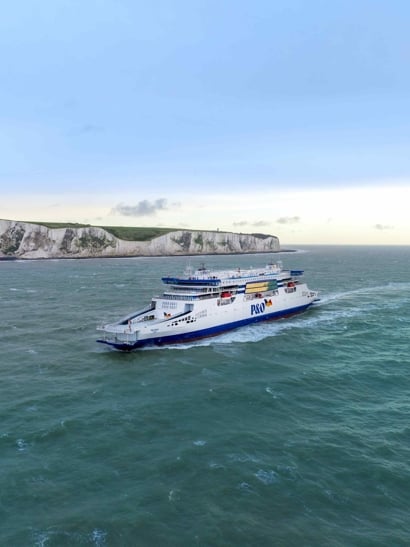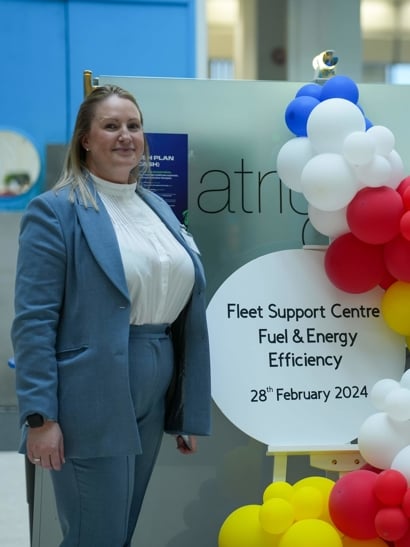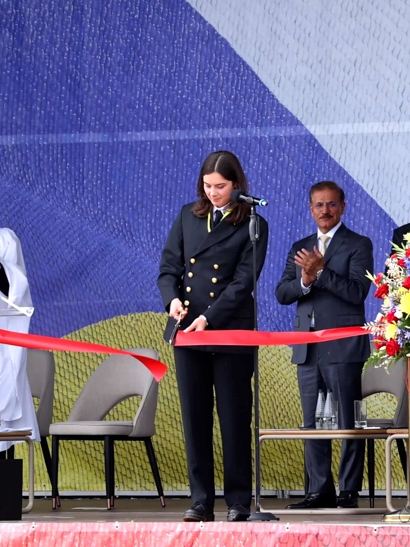
It’s easy to think that P&O has little regard for people given the headlines of the past two years. The events of March 2022, which involved a dramatic restructuring of its crewing model, sparked the ire of politicians, maritime interests and the UK public as the company was called to answer its case. Ever since, and despite maintaining its 15,000 crossings every year, its efforts to modernise its fleet, improve its fleet efficiency and invest in its people, almost seem to have gone unnoticed.
This year alone, the DP World-owned company has introduced P&O Pioneer and P&O Liberté, which sport novel designs and hybrid diesel-electric power plants, to replace the Pride of Canterbury and Pride of Kent on the Dover to Calais crossing, significantly reducing carbon emissions on the route. It’s opened its fleet support centre for fuel and energy efficiency in Dover to track, manage and reduce fuel consumption and expanded its efforts to recruit and retain seagoing and shore-side employees.
The public scrutiny of recent years has been felt keenly by its people. Among them is Fleet Support Centre Manager, Lauri-Ann Houlker, who, despite having had no prior knowledge of the business’s intention to restructure its crewing model, personally received direct negativity for working for P&O Ferries. For her, this was the low point in a career with P&O that spans 17 years and started with a six-week summer contract after leaving school. “I just never left,” she tells Horizons, with her career journey seeing her advance to Fleet Operations in 2011 as Fleet Safety Training Administrator and then move into crewing where she was looking after six ships and around 600 deck and tech crew, officers and ratings.
According to Houlker, P&O Ferries is on a cultural transformational journey, which involves “engaging and identifying how each individual can, personally, make a difference. Everyone has something to contribute”.
Tapping into the power of the individual is a top company priority. According to Karen Knox, who manages talent, learning and organisational development, a key focus for P&O Ferries is utilising its apprenticeship levy.
“Growing our apprenticeship programme is really important to us. Previously, we weren’t utilising even half of the apprenticeship levy, whilst still paying the funds to the government to support it. Now, we have 31 people undertaking development apprentices, with a further three waiting to commence their training, ” she says, adding that the company has four more people on traditional apprenticeships.


Another big focus for P&O Ferries is its cadetship programme, so much so that it selected one of its cadets Katrina Browne as godmother to the P&O Liberté. Katrina Browne, who has just completed her studies at the University of Plymouth will shortly join P&O Ferries, to continue to work onboard P&O vessels post-graduation. A love of sailing, her spirit of adventure and a clear map of career progression to captain spurred her studies and she has enjoyed her experiences traversing the English Channel.
“So many people in my class dismissed a cadetship on ferries, saying a regular route would be too boring. Little did they know that the although the destinations stay the same, every day is is varied. With the marine traffic situations on the Dover-Calais route, I believe you're kept busier than any cadet on any other ship type.”
P&O’s cadet programme in its current guise has been running since 2010. Before this, cadets were trained with P&O companies (Cruise, Cargo, Tanker, and Ferries) since P&O’s inaugural ships commenced trade in the 19th century.
While there is still a huge divide in the ratio of male to female – of the current 47 cadets on programme, only eight are female. In recent years there has been an increase in cadets opting to complete the full degree over the other options such as Higher National Certificates (HNCs), Higher National Diplomas (HNDs) and Foundation Degrees, with colleges and universities offering a wider range of programmes to make something available for all candidates to study, which in turn can only help to attract more applicants to the industry.
In the past 14 years, more than 150 cadets have completed their cadetships with P&O Ferries and another 18 cadets will join in September 2024. Anyone embarking on a maritime career or hoping to keep pace with the evolution in technology has their work cut out, says Fleet Support Service manager Houlker who spends her days surrounded by screens and evaluating multiple datasets to determine how best to enhance fleet performance and efficiency.
“We are an analogue industry in a digital world. Technology has evolved so much; we need to embrace it or we’ll be left behind. I feel elated to be part of a company that has introduced hybrid ships. The technology being used is first class and the first of its kind on a route that P&O Ferries operate,” she says.
“I love telling people what we are doing as a business. There is a lot of talk in the industry about what steps are needed to take us towards decarbonisation and digitalisation, but at P&O Ferries, we are actually living it.”






